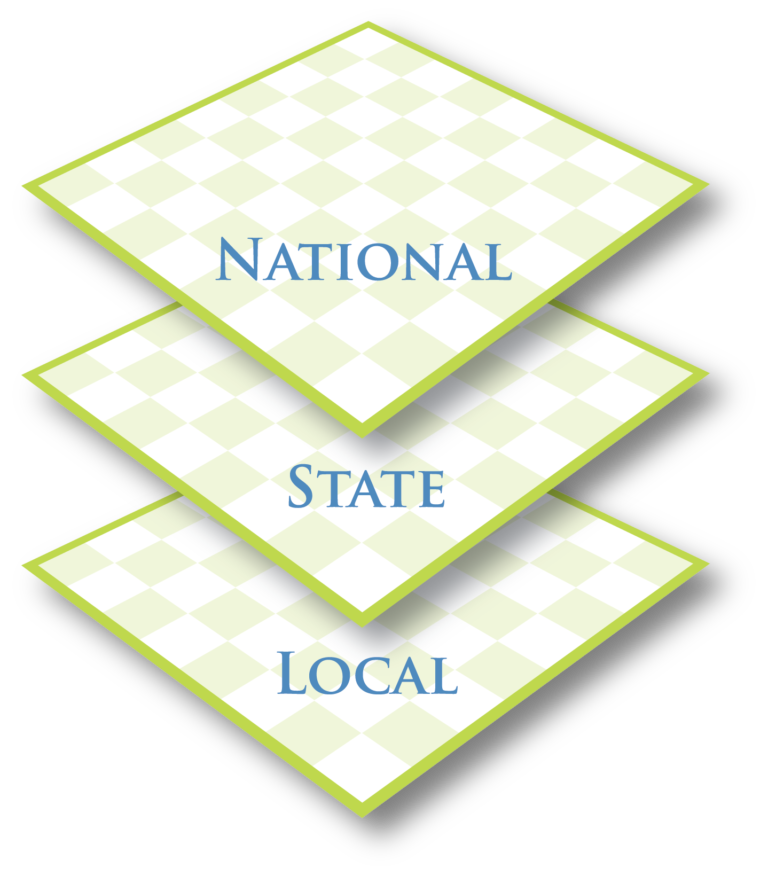
How does big change happen? When does it happen? What conditions make the environment ripe for change?
Political scientist John Kingdon recognizes open policy windows are those opportune times when three key things align to enable change:
- A recognized problem
- A viable solution
- The political will
Open policy windows, Kingdon¹ says, can occur when policies:
- Are congruent with the national mood
- Enjoy interest group support
- Lack organized opposition
- Fit the orientation of the prevailing legislative coalition or administration
- Are technologically feasible
- Are fiscally viable
Triple Layer Chess
In order to foster an environment that may build the political will around a policy, the Georgia Health Policy Center thinks of policy metaphorically as a game of triple layer chess. Policy simultaneously occurs at the local, state, and national levels. Playing this complex game of systems change requires players at each level to think about how their strategic decisions impact and are impacted by players at the other levels. Checkmate outcomes occur when there is greater alignment among parties both within and across the three levels. Policy is most viable when there are wins at all three levels. This alignment will maximize return on investments and magnify the impact on health.

To apply the metaphor, think of triple layer chess as mindset — an approach to problem solving that revolves around key strategic questions that are asked at all times with the three-layer chess boards in mind. Some questions to keep in mind include:
- What are the implications for local policymakers, the community, and the individuals most affected by the policy?
- How might state government or foundations create a more conducive environment for
addressing the problem? - What is the role of the federal government and national foundations or businesses in facilitating positive policy change?
- How do each of these levels of intervention and activity relate to one another?
Six-Question Framework for Evaluating Policy
The Georgia Health Policy Center originally developed the Six-Question Framework for Evaluating Policy to assist state legislators. By applying the five W’s and How, the Six-Question Framework can help local wellness funds strategically evaluate policies that may impact the design of the fund, strategic uses of the fund, and the influence of the local wellness fund collaborative on local and state policy. Questions to consider include:
1. WHAT is the important (perhaps troublesome) trend related to health? What is the shape of this trend over the past several years?
2. WHO are the stakeholders concerned about the trend?
3. WHY this trend (what’s the cause, what is responsible)?
4. WHERE is there leverage (some policy) to address the underlying cause of the trend?
5. HOW will it work? How will it play out over time? How might unintended consequences occur? How might the policy positively or negatively impact:
a) Health status?
b) State health spending?
c) Health care system?
d) Health equity?
6. WHEN would the policy create an impact on health status? When would you see an improvement in some other indicators (i.e., spending, services)?
Impact Investing: The Way Forward
This is one of the products of the Impact Investor Project, a two-year research partnership between InSight at Pacific Community Ventures, CASE at Duke University, and ImpactAssets. This report is a synthesis of fundamental cross-cutting themes from 12 high-performing impact investment funds with lessons of relevance to local wellness funds, including around policy symbiosis and the intersection between impact investing and government.
Wellness Funds: Flexible Funding to Advance the Health of Communities
This issue brief from the Funders Forum on Accountable Health at George Washington University examines policy options policy interventions to address challenges identified in setting up and maintaining local wellness funds. The considerations will be of interest to local wellness funds, as well as public and private funders interested in scaling this model for aligning community resources.
Agendas, Alternatives and Public Policies
This book by John Kingdon outlines his Multiple Streams Framework as a tool to understand policy making and agenda setting. The book can help local wellness funds learn how they can influence policy outcomes by recognizing when an open policy window exists with alignment of a recognized problem, a viable solution, and the political will.
- Kingdon, J. (2010). Agendas, Alternatives, and Public Policies, Update Edition, with an Epilogue on Health Care (Longman Classics in Political Science) 2nd Edition. New York, N.Y.: Pearson.




